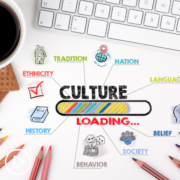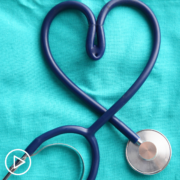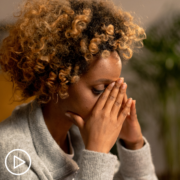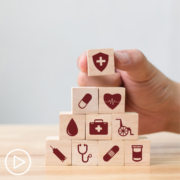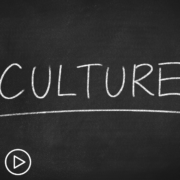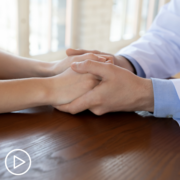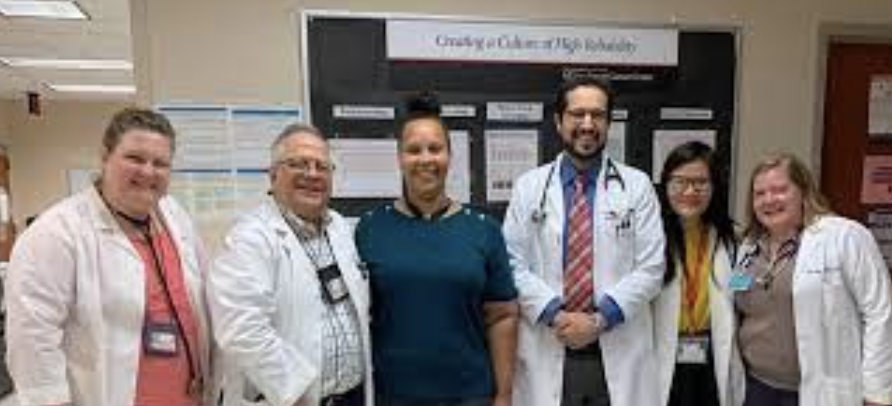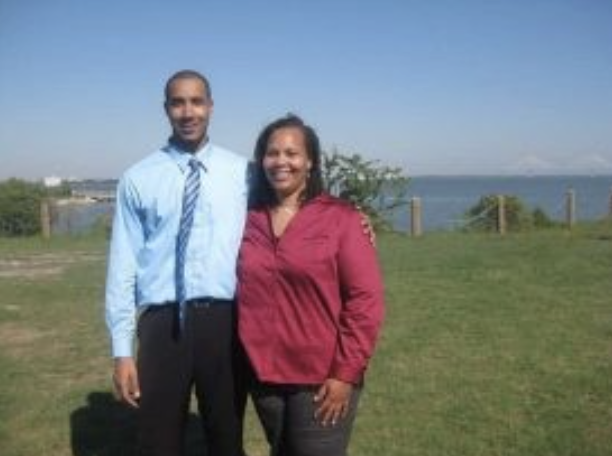Equity Rx, Cancer Care for the Whole Patient from Patient Empowerment Network on Vimeo.
What is culturally competent whole-person cancer care, and why is it important? How can patients maximize their well-being for the best possible cancer treatment outcome? A cancer survivor, a naturopathic doctor, and a public health scientist share solutions on how the whole patient should be considered in cancer care.
See More From Rx for Community Wellness
Related Resources:
Transcript:
Dr. Nicole Rochester:
Hello and welcome to Equity Rx, Cancer Care for the Whole Patient. I’m your host, Dr. Nicole Rochester. I’m a pediatrician and the CEO of Your GPS Doc. This is a Patient Empowerment Network program, and I’d like to start by thanking our incredible partners, Triage Cancer, the Leukemia and Lymphoma Society, and CancerGRACE for their support. Today, we’re covering a very important topic, the significance of treating the whole patient while providing medical care, particularly for underserved communities. For me, when we think about self-care in the context of whole person care, it’s often considered to be a luxury, particularly in BIPOC communities, mental health and self-care are not always prioritized, and we know that this is… And we know that this is important as well for those with the cancer diagnosis, so how do we change that? We’re going to be talking about how to remove this taboo and how to encourage meaningful mind-body connections, we’re gonna talk about what has worked and what hasn’t worked, and most importantly, how do we ensure that Equity, Rx in cancer care occurs on an everyday basis.
How do we make sure that the entire patient, the whole patient is considered. I’m excited to introduce our panel to you today, we have Aswita Tan-McGory. She is the director of Equity and care implementation at Massachusetts General Hospital. She’s also the Director for the disparity solution center. We have Sasha Tanori. Sasha is a Patient Empowerment Network, AML Empowerment Lead and a cancer survivor. And we have Dr. Broderick Rodell He is an educator, a doctor of naturopathic medicine, and a wellness expert. Following this program, you will receive a survey and we’d be delighted to get your feedback, this helps inform future programs that we produce. Please remember that this program is not a substitute for seeking medical care, so if you have any questions following this program, please be sure to connect with your healthcare team on what options are best for you.
So, let’s start with a definition of whole-person care. Whole-person care is defined as the patient center, optimal use of diverse health care resources to deliver the physical, behavioral, emotional and social services required to improve the coordination of care for patients, their well-being and their health outcomes. So, I’d like to start with you, Aswita and I’d like to know your thoughts on Whole Person Care, and why do you think that this has been such a taboo subject for so long, and also why is it important for us to address whole person care?
Aswita Tan-McGory, MBA, MSPH:
I think that part of the problem is that our healthcare system is very, very fragmented, so if we think about… We have primary care, then we have specialty care, then we have care in the hospital, and oftentimes there’s no communication or communication is sort of inconsistent between those pieces, and so we as a healthcare system don’t promote this idea of whole person care, where you would really look at a patient, see them, see them in their environment, oftentimes, we’re seeing patients in our own institutions and we really don’t know anything about what we’re sending them home to, right? Unless we ask or we screen.
So I actually think it starts with how we build our systems in many ways, as a very sort of system that doesn’t really work to encourage thinking about the patient in the whole way, and that means the primary care physician being part of the care team with specialty care, getting that conversation just from an implementation perspective, I think this is a real challenge in our system, there’s other things as well, but I think that’s a big piece towards how do we ensure that for the patient… And I’m sure all of us have had our own experiences in healthcare where we are like, they’re not talking to each other. Well, why does this this doctor not talking to my primary care doctor aren’t they like logging into the same system? And then if you go outside of your system it’s even more challenging, so.
Dr. Nicole Rochester:
I completely agree, and I can relate to every single thing you said as both a position and as a former caregiver, I will say as a pediatrician, I felt that this idea of whole person care, even before it was really a thing that’s kind of incorporated in our practice out of necessity, and we know that it’s important for the health of children to be involved in what happens to them at school and what happens to them in their child care setting, what’s happening in their homes.
And so that was kind of my reference point, but when I became a caregiver for my dad and kind of stepped into the world of adult medicine, I experienced exactly what you describe, Aswita. Just this fragmentation providers not talking to one another, and just a lack of appreciation for the importance of our environment and the things that we’re exposed to in our homes than in our communities, and how that is so intricately connected to our health. So I really appreciate that.
Aswita Tan-McGory, MBA, MSPH:
Yeah, I want to just tag on something you just said is, I work with a lot of pediatricians and pediatric hospitals, and they are the angels in our system, if I can say so, you… And they definitely have cornered that market of really thinking of social determinants of health or the whole system for their pediatric patients in a way that I think adult medicine is just catching up on, so I totally agreement, like what you said, and I think it’s because you’re working with kids, you can’t not talk to the parents, not think about what is the school like you know so your forced to because of that environment, but that’s really a model that we should be using for all of our patients.
Dr. Nicole Rochester:
I completely agree, completely agree. Sasha, what are your thoughts about whole-person care and where are your providers gotten it, right, maybe where have they gotten it wrong?
Sasha Tanori:
For me personally, I can’t speak on every Mexican-American, but at least for me personally, it’s definitely been a struggle because where I come from, it’s a very like low demographic, we don’t have a whole lot of resources and stuff like that, so getting care is… It’s not the easiest. I’ve had to go to several doctors before I even got diagnosed, and I didn’t even get diagnosed in my hometown, I had to be sent to San Diego because they had no idea what was going on. They were like, We don’t know what’s wrong with you. Go home, they kept giving me misdiagnosis after misdiagnosis, and especially with being a plus-sized Mexican-American, they were just like, Oh, if you lose a couple of pounds, you’ll be fine, and I show up at the hospital with bruises on my body and they’re like it’s because you’re overweight, and I’m like, That doesn’t really make a whole lot of sense. So yeah, it was definitely difficult trying to find a good health care professional who would listen to me, and I had to leave out of my Imperial Valley, out of my demographic to go find the help because…
And even then, they were kind of like, Well, it could be this blood disease, it could be this, it could be that, and they were like, Oh well, is anyone in your family… You’re Mexican, is anyone in your family have this type of illness, do they have diabetes, or this or that. And I was like, No, just help me. Don’t worry about them. Don’t worry about my family. Don’t worry about them. Worry about me. And finally, I think after two months or something of just going to doctor’s appointments, after doctor’s appointments, they finally were able to give me proper diagnosis, but it shouldn’t have to take that many trips to the hospital and seeing this many doctors for them to figure out what was wrong. And a lot of it is because of, like you said, it’s because of the whole inequity of being a person of color, and I’m only half Mexican, but a lot of people see that part of me first, and they think they automatically start being prejudiced or they start judging you based on the way you look, the way you talk and stuff like that, so that way… It’s definitely been a struggle, especially being here in the Imperial Valley, we’re so close to the Mexican border, so they just automatically…They’re like, No, it’s just straight up, no.
Dr. Nicole Rochester:
Wow, I’m really sorry about that, and I appreciate you sharing your story and you’re bringing up some things that we’re definitely going to get further into as we start to talk about bias and culturally competent care. What about you Broderick? And You’re a naturopathic physician, you’re a wellness expert, so you probably fully… Not probably you fully understand the importance of whole-person care, I feel like that’s at the root of your specialty, so maybe you can give us some ideas about how you approach this and why whole person care is so important.
Broderick Rodell:
Yes, thank you. And I do fully understand the various issues and concerns that can arise when you go to a medical doctor and the specialist and not talking to your primary care physician, and so I focus a lot of my attention on the individual and what you can do as an individual to care for yourself, to educate yourself about well-being and help, it doesn’t deny the various social conditions or structural issues there, it’s just that I feel like we have our greatest amount of power, a great capacity to act and taking as much responsibility as we possibly can in our own care through educating ourselves about how our bodies work, how our mind works, how disease manifestation arises, taking advantage of the tools that we have available to us via the internet and educating ourselves so that we can be advocates for ourselves when we have a conversation with the various medical practitioners, but I’ve also really emphasize what can I do to maximize my health, my well-being, what choices can I make in my life to make my life to no life with maximum wellness and well-being and minimal suffering. And I do spend a large amount of time focusing on training the mind, reducing stress, educating yourself around, what can I do to eat well, nutrition, what can I do to exercise? To get my body moving, what are the various things that I can do to care for myself to the best of my abilities and not give too much power over to medical doctors on a medical system that not always…
Now, I wanna say, I’m gonna be careful, I say this can be quite incompetent and that incompetence is associated with, I think what was mentioned earlier, a lack of communication. A lack of communication, the way the system is set up, it’s kind of dysfunctional and the various incentives and not enough time spent with patients, and if you’re not spending enough time with patients and you’re not communicating with other practitioners that are working with these patients, then you’re not gonna have a very good idea of what’s going on in this patient’s life and what could be contributing to their illness. So, therefore, it’s incumbent upon the patient, we as individuals, to try to learn as much as we can and try to get our communities involved to help create educational programs to facilitate that education and that awareness.
Dr. Nicole Rochester:
I completely agree, Broderick the ideas that you mentioned in terms of we as patients and family members and communities educating ourselves about our own health and advocating for ourselves as someone who left medicine to become a professional health advocate, I’m all about advocating for yourself, speaking up, understanding what’s going on with your body? And I know that that can be challenging. And some people feel like it’s unfair, if I’m sick, the last thing I should have to worry about is fiercely advocating for myself in a medical setting, and it is unfair to some degree, but as you stated in this system and the system that we’re currently operating in it is absolutely necessary, and I love that you mentioned mind, body spirit, and as a traditionally trained physician, I will admit that we don’t get that connection, that’s not something that is part of our traditional training, and it’s unfortunate that we kind of just see the body over here, and then the mind over here, and we know that we are all… This is all part of who we are, and that if your environment is not optimal, if your mental health is not optimal, if your spiritual health is not optimal, then that’s going to manifest itself in your physical health.
I wanna start talking about health inequities, and I wanna piggy-back off of something you just said, Broderick, because you talked about kind of eating well and exercising, and sometimes those things, those behaviors are kind of weaponized against patients, particularly if they are in environments where that doesn’t just come easy. So we know that due to structural racism, due to inequities, not everybody has access to fresh fruits and vegetables, healthy foods, not everyone has access to green spaces, nice parks where they can go outside and safety and exercise, and that’s something that we’re being made increasingly aware of is how these social determinants of health impact healthcare. So I wanna move and start to talk about the importance of culturally competent care, or I like to call it cultural humility, I don’t know that we can really ever be competent in someone else’s culture, but I wanna talk about how those come together, this idea of being respectful and sensitive and aware of individuals culture and how that connects to some of the health inequities that we experience, so Aswita, I know this is an area of expertise for you, so I’d love for you to chime in.
Aswita Tan-McGory, MBA, MSPH:
Yeah, I mean, I would love it if every physician or nurse or PA started the conversation, what has been the biggest challenge for you in the last six months? If you ask that question, I mean, well the patient will be like, Oh my God. And not around just medical issues, they all align right? If you don’t have housing, you’re gonna have medical stress, like Broderick said. I’m just calm listening to you, so I’m gonna guess that you have is really positive vibe that’s probably missing for many of us because we aren’t practicing the things that you encourage, and so I would just say that it’s really difficult in the system like I said, we set up, and we mentioned 15 minutes, doctors don’t feel like they have time to ask that question, but you’re doing it in other ways, we implement social determinants of health screening. Well, that’s really that question, right. But you formalize it because it’s not happening, so now it becomes like a screening question, and I will just say that we’re very narrow-minded in our view, I think I have seen a change in the very beginning when we started the work in our center in 2006, a lot of pushback was around thinking about what happens in the patient outside of our walls, it said, Well, I didn’t go to medical school to solve the problem of housing, I didn’t go to medical school to figure out how to get somebody on benefits, and I think health care system realized it doesn’t matter what you do in the hospital, it will be undone when they get home to a situation where they can’t maintain it, they can’t provide that support, they don’t…
They’re stressed out, they have mental health issues, so I think they’re finally getting there, but I think just acknowledging that the person in front of you has different experiences based on, language, education, gender, ability, sexual orientation… I don’t think that’s a bad thing. I think you just need to own it, we’re working on it, so I do it better than others, but I don’t know any healthcare system, honestly, that’s nailed this to the way that we probably should, so… I’m with you Broderick, we don’t do this very well, and most of my job includes dismantling these systems that we built to benefit the people in power and leave everybody else behind, and so that’s been really the focus in our work.
Dr. Nicole Rochester:
Wonderful, thank you so much for sharing that. And for all the work that you’re doing in this area. Sasha, from your perspective, and you mentioned you’re a Mexican-American, you mentioned that there were significant barriers for you in terms of getting a diagnosis, having to leave your community. So, I love for you to share more about that, this idea of cultural humility, cultural sensitivity, and how that played out or maybe didn’t in your experiences with the healthcare system.
Sasha Tanori:
Yeah, I live in the lowest poverty line of California, so there’s not very much out there at all in my area, just to get my diagnosis, like I said, I had to leave out of my community to go get the community… To go get the diagnosis. Sorry. And when I did that, it was… A lot of it had to also do with your… For me personally, it has to do with like generational. My father doesn’t believe in diagnosis, diagnoses, to him, it’s like every time I kept coming to him and complaining about this issue, he was just like, Oh, you’re exaggerating, or it would be like the typical inaudible], and put some Vix on it and you’re fine type of response, and I kept bugging him and bugging him, and he didn’t believe me, nobody believed me because it’s just such a… Like I said, I live in a… What’s the word I’m thinking of, I’m sorry. I live in a community that they don’t take things like this seriously from Mexicans, if a white girl was to go to the hospital and say, Hey, I’ve got bruises, it’s like, Okay, let’s do testing right away, but I kept… And it is a lot of my generational, I think, trauma from my parents or from my dad mostly, that I didn’t even believe myself, it’s just like…
I kept putting it on the back burner. I kept thinking, No, there’s nothing wrong. No, there’s nothing wrong. No, there’s nothing wrong. And I wish that I would have advocated for myself a lot sooner, I wish that I would have taken my own problems more serious because I didn’t… I didn’t think anything was on either, I just kept ignoring it because that’s just how my mind was trained from my community, from my parents or my dad mostly, and finally, once I was able to… Once I started getting really, really serious, I still didn’t get the help, I need it right away, it was now kept pushing it back on, you need to lose weight, or you’re anemic, or you have this blood disorder, so take this medicine, like nobody really took anything… I was saying serious because I also didn’t take it serious, my community doesn’t take it serious, my dad doesn’t take it serious, and that all just comes back to being Mexican, that’s just how it is when you’re Mexican, you don’t really take any of the serious issues serious, you go to work and you take care of your family. And you put yourself on the back burner.
You put yourself last. And it was really hard. Yeah, but now that I been through everything I’ve been through, I’m seriously, so passionate about making sure that people, especially Mexicans realize, Hey, whatever you’re feeling, whatever you’re going through, whether it’s physical, emotional, mentally, it needs to come first, no matter what.
Dr. Nicole Rochester:
Thank you, Sasha. That is so incredibly important, and even the way you’re sharing what you said towards the end about, You go to work, you take care of your family, this all goes back to cultural competence, all goes back to social determinants of health. It explains why often, racial and ethnic minority groups, those in lower income brackets have poor health, it’s not biology, but when you are needing out of necessity to focus on your next meal, then you’re going to push off going to the doctor, you’re going to neglect your mental health, which brings me back to you, Broderick, because we know that stress and anxiety and depression and all of those things impact your physical health, and as I said earlier, I think traditionally, there’s been this ridiculous disconnection between our minds and our bodies, and we know a lot more now, in fact, there’s a study, there are many studies, but there’s a study specifically looking at Prostate Cancer by Dr. Burnham, a researcher, and what they found in this study is that they looked at prostate cancer cells from African-American patients and white patients, and when they treated these cells with stress hormones, they saw that the black patient’s prostate cells would begin to up-regulate the genes and the proteins that are known to make that cancer more resistant to therapy, and so it starts to look at the role of stress and stress hormones, and we know that there’s increased stress among minority communities, among… Sorry, urban communities, those who are otherwise disenfranchised, so from your perspective, can you just share a little bit about the connection between stress and physical illness and maybe how you approach that in the work that you do?
Broderick Rodell:
Yeah, so I’m just reflecting on what Sasha was saying and how the depth of what you’re saying and how this relates to stress. So these various patterns we don’t operate, we have a framework that we all operate from, and it’s beneath the surface of our conscious awareness and so our subconscious mind operating system is there, but that operating system comes from our conditioning, we’re conditioned by our families, by our local communities, our societies, and so the various structures that are in place are facilitating our conditioning and from our conditioning we… That our conditioning creates our perspective, the framework that we operate from, that’s determine… That’s gonna determine how we relate to our experiences, and how we relate to our experiences can be gracefully or it can be stressfully, just to put it in those two different terms, and so that stress, that is created based on how we’re relating to our experiences has a historical perspective, and so we have to address those issues. We can address on familial issues that has a historical relationship and say that maybe the relationship that my mother and father or grandparents had towards their own health is not necessarily to be the most optimal way to do that, and they may have had those ways of relating to their experience, based on their conditioning, based on the suffering that they’ve been experienced, environmental conditions that were conducive for that mental framework that they’re operating from, and so we have to work towards transforming that, and again, the place where we have the most power in ourselves, How can I change myself? When I listen to Sasha story, Sasha says, I have to change, I have to go somewhere else.
I can’t depend on my father to do it ’cause he’s gonna tell me to put Vix on, but that’s not gonna work for me. I have to advocate for myself, and so how do we increase that by increasing our education and learning about ourselves and learning about our mental models that we’re using to relate to our experiences and transforming those mental models to reduce unnecessary stress and tension, because when we’re under unnecessary stress, we have our epinephrine cortisol, these hormones that are increasing in our body, that’s gonna suppress our immune system. It’s gonna cause damage in our blood vessels, organs are not gonna function optimally, and I think that we’re gonna keep finding out more and more about this. I was interested, as you hear that about the prostate, prostate cells in African-Americans, why would that be the case? You’ve got generations of hyper-vigilance for historical reasons, cultural reasons or social reasons, then of course, that’s gonna get passed on from generation to generation, a sense of hyper-vigilance a sense excessive amount of stress hormones was floating around in the bloodstream, and it’s gonna have a significant influence on how the body is capable of dealing with various illnesses be it cancer, be it cardiovascular disease or any other disease that’s associated with, or ____ disease that’s associated with stress these days.
In particular, with cancer it’s very interesting, that relationship and why are these cells dividing and rapidly producing in the way that they’re doing, and how is that related to stress? I don’t think it’s… No, simple relationship there. You can’t just say, Stress causes cancer, I’m not saying that at all. But there is a correlation, there is a relationship, and if the thing that we can tackle, we can’t change our genes, but what we can do is change our relationship to our experience. Transform that to reduce the amount of stress or suffering and maximize well-being, and that’s the kind of work that I try to focus my attention on and what comes out of that is, Okay, I need to work on how I relate to my experience, but also How do I create favorable conditions in my internal system, in my body through the food, it through the exercise that I do it, through the literature and I expose myself to etcetera.
Dr. Nicole Rochester:
No, that was perfect, Broderick. That was perfect. I appreciate that because as we wrap up, we want to start to share solutions, how do we begin to change the conversation among healthcare providers, among community-based organizations, policymakers, those that influence the health of individuals and communities, and what you’ve described is what we can do. The power that we have within ourselves to reframe how we look at our circumstances, to reframe how we relate to our experiences to begin to minimize the stress to the degree that we can individually and how all of that really impacts health. I really, really appreciate those comments. Sasha, I’m going to go to you next and then I’m going to finish up with Aswita. If you had some advice that you could give from a patient’s perspective, and maybe you’re talking to a policy maker or healthcare providers, but how can we do better in this area as it relates to Whole Person Care, culturally competent care?
Sasha Tanori:
I would definitely say take your patients more seriously and not just like one-offs, okay, bye. A lot of the times they just do a couple of tests and they’re like, Oh well, we can’t find anything, so let’s just move along and there needs to be more conversation as well.
A lot of the doctors will come in and talk to you for like you said, 15 minutes, and then it’s like, Okay, you know, well, we can’t find anything wrong, so just go… And it’s like, No, let me explain everything, let me explain how I’m mentally feeling, how I’m physically feeling, how stressed out feeling, how emotionally I’m feeling, and there’s just so many different layers to just one, if you come in and say, Oh, well, my hip hurts. Okay, but why I explain more to it, not just okay let’s do an x-ray and you leave. Like there needs to be a lot more conversation going on between the patient and the doctor, there needs to be a lot more understanding where it could also be stress as it relates to work, it could be stress related to family, to love the ones… To kids, to spouses, there’s so many different things on top of that, that’s more than just, you know, Hey, you know like, I just need a prescription and you can go… There’s so much more conversation needs to be have then I really wish that a lot more health care providers would have that conversation with them, I know they don’t always have the time, they’re busy, but at least a little bit more compassion, a little bit more understanding, going about when it comes to patients.
Dr. Nicole Rochester:
I appreciate that, and you’re right. The time is an issue. And I will tell you as a physician and as somebody who has tons of physician friends, it causes internal conflict within the doctors, because I don’t know any doctor that got into this for any reason, primarily, other than to help patients, and so to be placed in these situations where you know that you’re falling short of providing the care that your patients need is actually quite disturbing. So that leads me to you, Aswita. So we’ve talked about all the things that need to happen in an ideal world, but as you described earlier, the system in which health care is provided in our country is dysfunctional, it’s broken, and so as someone with your background, what are some of the solutions? What are some of the things that healthcare systems and organizations can do with all these limitations that we’ve all been talking about today?
Aswita Tan-McGory, MBA, MSPH:
This actually came from my colleague who’s a psychiatrist, and we did a webinar together, and she mentioned this, and I just really loved it as a solution which is talking as a pathway to healing, when we think about… A lot of what I heard today, the big thing is a lack of trust between a patient and a provider or a patient and a health care system, there was so much trauma in our communities that we don’t talk about, and so I would say that like…
One solution is, we as a system need to talk about these challenges more openly or more… I mean I have this sign behind me it says get comfortable being uncomfortable to talk about racism, but I think also within our own communities, we need to talk more about the challenges, the things that we just sort of tolerated that are not okay anymore, and getting mental health care, acknowledging that we are disproportionately attacked when we go out on the streets, all of those things, we need to more openly talk and that is a pathway to healing, which I think this country really could use, and so my solution is simple but difficult, but probably cheaper than any other solution that I would offer to fix the issues. I think we just need to start there, yes, we can do many things, but I think talking about this as a pathway to healing would go a long way.
Dr. Nicole Rochester:
Wow. Talking as a pathway to healing. That is powerful. Well, I want to thank all of you for spending some time with me today, this has been a phenomenal conversation, one that I’m sure we could all continue for hours and hours and hours. But unfortunately, we do have to go.
I want to thank all of you for taking time to be part of this Patient Empowerment Network, Equity Rx webinar. Just to give a recap, we’ve learned about the importance of culturally sensitive Whole Person Care, how culturally competent or culturally sensitive whole person and care is important in reducing health inequities, we talked about how stress impacts lifestyle and cancer and all other chronic diseases, and we’ve also tried to provide you with some actionable pathways and potential solutions to this problem, it is truly these actions that are the key to staying on your Path to Empowerment. I’m Dr. Nicole Rochester, thank you for joining this Patient Empowerment Network program.

